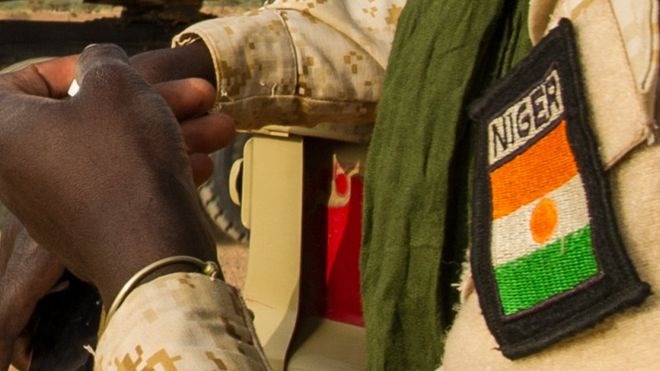‘The urgency for a cohesive and collaborative response has never been more pressing … failure to fill the void left by Niger’s exit could plunge the region into deeper insecurity’.
Analysts in the Lake Chad region have warned of a “looming security crisis” after the Niger Republic formally announced its exit from the regional military coalition that is instrumental in combating armed groups in the area.
The announcement was made in a bulletin released by the Nigerien army and broadcast on state television on Saturday, March 29.
The coalition, previously known as the Multinational Joint Task Force (MNJTF), will now be referred to as “Nalewa Dole” and “reflects a stated intent to reinforce security for oil sites”, according to the bulletin.
“Nalewa Dole”, loosely translated as “Peace by Force”, will safeguard oil facilities and sites which have been attacked by armed groups.
The MNJTF, comprising troops from Nigeria, Niger, Chad and Cameroon, was formed by the four nations bordering Lake Chad in 2015 to combat growing violence and conflict, including vicious attacks carried out by members of the Jamā’at Ahl as-Sunnah lid-Da’way Wa’l-Jihād (JAS), more commonly referred to as Boko Haram, and its offshoot, the Islamic State West Africa Province (ISWAP).
Niger’s low participation
“Niger withdrew from the MNJTF weeks after the July 2023 military coup that toppled President Mohamed Bazoum, but was not formally announced until now,” Ibrahim Moussa, a political and international relations specialist, told Ndarason.
“Niger’s participation in the MNJTF has been very low since the Nigeria-led regional bloc, the Economic Community of West African States [ECOWAS], threatened to use military force to restore democratic rule in the country.”
Mixed reactions to Niger’s decision
“I think it’s a great mistake to withdraw our troops from the MNJTF and we will regret it in the future,” a resident of Diffa, who asked to remain anonymous, told Ndarason. “I know the MNJTF has its lapses when it comes to counterinsurgency operations, but I still believe it is better to remain in the MNJTF.”
Another resident described the decision as a step in the right direction, citing the MNJTF’s “failure” to discharge its responsibilities as expected.
“It is a good decision. We can’t rely on the MNJTF anymore. We need an alternative.”
Experts warn of looming security crisis
Zagazola Makama, a counterinsurgency expert in the Lake Chad region, emphasised the need for Niger and its neighbours to take swift and decisive action to mitigate the crisis.
“Niger’s exit from the MNJTF has left a significant security vacuum, particularly along its northeastern border with Nigeria.
“The porous border has long been a weak link in counterinsurgency efforts and without Niger’s military presence, Boko Haram and ISWAP may find fertile ground to establish new operational bases, smuggle arms and launch cross-border assaults.
“The remaining MNJTF members, Nigeria and Chad, must urgently restructure their military strategies to address the vacuum left by Niger’s withdrawal,” he said.
“Military sources in Maiduguri have indicated heightened risks for border towns like Damasak and Goskeru, which have historically been targets of Boko Haram incursions. The absence of Nigerien forces, who previously acted as a buffer, significantly escalates the threat level, making these areas prime targets for renewed terrorist activity,” Makama said.
“Failure to act decisively could allow insurgents to capitalise on the disruption, leading to a resurgence of violence that threatens not only Niger but the entire Lake Chad Basin.”
Remadji Hoinathy, a senior researcher, said: “The region should carefully examine the MNJTF’s challenges and some member states’ grievances to strengthen operations and avoid the same fate as the G5 Sahel force.” * See end paragraph
Ibrahim Moussa said: “The decision taken by Niger will jeopardise the security situation in the region, particularly in the border communities between Nigeria and Niger. It’s still unclear how the remaining countries will fill the vacuum created by Niger.”
A critical juncture
Makama said: “Niger’s withdrawal from the MNJTF marks a critical juncture in the fight against terrorism in the Lake Chad Basin.
“The implications for Niger are profound, as the nation faces the dual challenges of securing its borders and managing internal stability amid rising insurgent threats.
“As regional leaders grapple with these challenges, the urgency for a cohesive and collaborative response has never been more pressing. Failure to fill the void left by Niger’s exit could plunge the region into deeper insecurity, with devastating consequences for millions.”
Chad’s threat to leave MNJTF
In October last year, Chad threatened to pull out of the MNJTF after about 40 of its soldiers were killed in an attack on a military base in the lake region.
President Mahamat Idriss Déby Itno blamed the attack on Boko Haram. He said he was considering withdrawing Chad from the MNJTF.
The president’s office alleged that the MNJTF had become “lethargic”, which hindered Chad’s ability to engage in counterterrorism operations.
The G5 Sahel
On December 2, 2023, Burkina Faso and Niger announced their withdrawal from the Group of Five for the Sahel (G5 Sahel). Mali had previously withdrawn. The G5 Sahel force was effectively dissolved after the withdrawal of the three countries, leaving only Chad and Mauritania, which have since paved the way for its dissolution.
AYSHA MUSTAPHA KOLOMI








